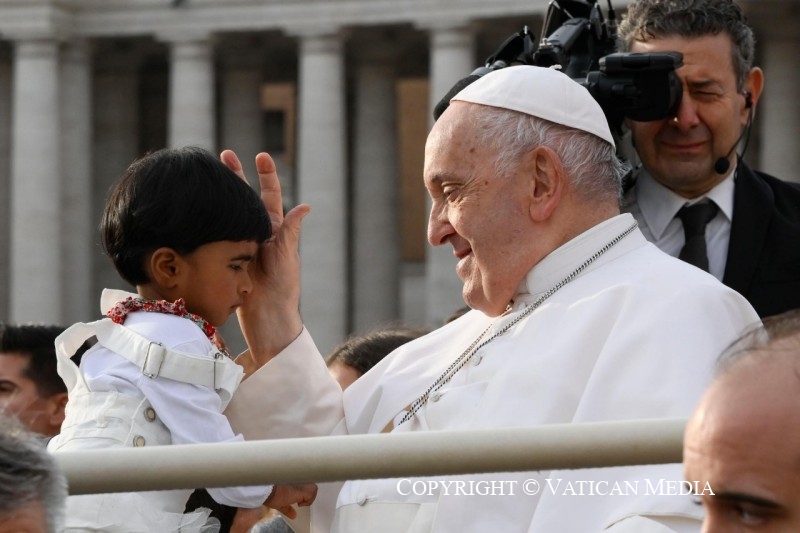Pope: desperate situation in Gaza, we are only on the side of peace
Yet another appeal at the end of the general audience in St Peter's Square. The pontiff has called for another day of fasting and prayer for peace for 27 October, during which he will preside over a celebration. In the catechesis on the great witnesses of evangelisation the "apostolate of meekness of St Charles de Foudauld, prophecy for today's world".
Vatican City (AsiaNews) - "The victims are increasing and the situation in Gaza is desperate, please do everything possible to avoid a humanitarian catastrophe". After the horrendous news of the hundreds of victims in the bombing of the al Ahli hospital in Gaza, at the end of today's general audience in St. Peter's Square Pope Francis once again called for an end to the war that has been raging between Israelis and Palestinians for ten days now .
“The possible widening of the conflict is worrying, while in the world many war fronts are already open" - continued the Pope.
"Let the weapons be silent, let the cry for peace of the people, of the people, of the children, be heard. Brothers and sisters, war does not solve any problems, it only sows death and destruction, increases hatred and multiplies revenge. War erases the future. I exhort believers to take only one side in this conflict: that of peace; but not in words, with prayer, with total dedication."
Hence the invitation to continue praying for peace in the world, without forgetting "the tormented Ukraine, whose drama continues".
In this sense, the Pope has also announced another day of fasting, prayer and penance for Friday 27 October, with a moment that he himself will preside in Rome in St. Peter's Basilica at 6pm. A moment in which he invited everyone to join "in the that they deem appropriate, the sisters and brothers of the various Christian confessions, those belonging to other religions and those who have the cause of peace in the world at heart".
Continuing the cycle of catechesis on zeal in evangelization, today Francis dedicated the reflection in the general audience to the figure of Saint Charles de Foucauld, who precisely in the Holy Land discovered his vocation to become "brother of all" who would then lead to sharing the life of the Touareg in the Sahara desert.
Francis invited us to rediscover de Foucauld's secret in having found in Jesus the reason for his life. “I have lost my heart for Jesus of Nazareth,” he wrote to a friend.
“The first step to evangelize is to have Jesus at the center of our heart - commented the Pope - and to lose one's head for him. If this doesn't happen, we can hardly show it with our lives. Instead, we risk talking about ourselves, about our group, about a morality or, even worse, about a set of rules, but not about Jesus, about his love for him, about his mercy." “I see this,” he added, “in some new movement that is emerging.”
“They talk about their vision of humanity, their spirituality, and they feel they are on a new path. They talk about many things, organizations, spiritual paths, but they don't know how to talk about Jesus. It would be nice for them to ask themselves: 'I have Jesus at the center of my heart, have I lost my head a little for Him?'".
Alongside this aspect, Pope Francis today underlined Charles de Foucauld's "apostolate of meekness", a "prophecy for our time".
“He, who felt like a 'universal brother' and welcomed everyone – he explained – shows us the evangelizing power of meekness and tenderness. God is always close, always compassionate, always tender. And Christian testimony must go along this path: of closeness, of compassion, of tenderness. He said he was 'servant of someone who is much better than me'. Living the goodness of Jesus led him to form fraternal bonds and friendships with the poor, with the Tuareg, with those furthest from his mentality. Little by little these bonds generated fraternity, inclusion, valorization of each other's culture."
“Goodness is simple and requires us to be simple people who are not afraid to give a smile. And with his smile, with his simplicity, Brother Carlo bore witness to the Gospel. Never proselytism. Let us ask ourselves then – concluded the pontiff – if we bring Christian joy, Christian meekness, Christian tenderness, Christian compassion, Christian closeness to ourselves and to others”.







.png)










